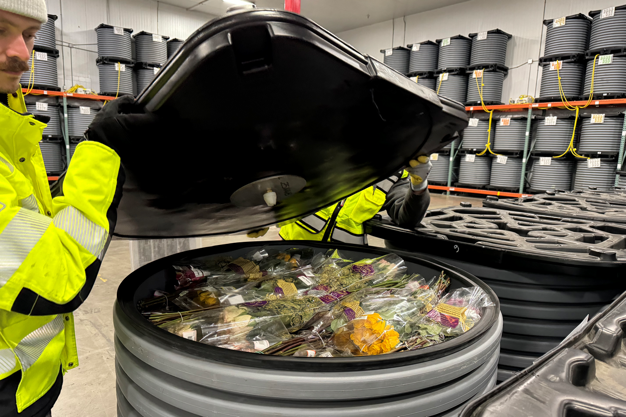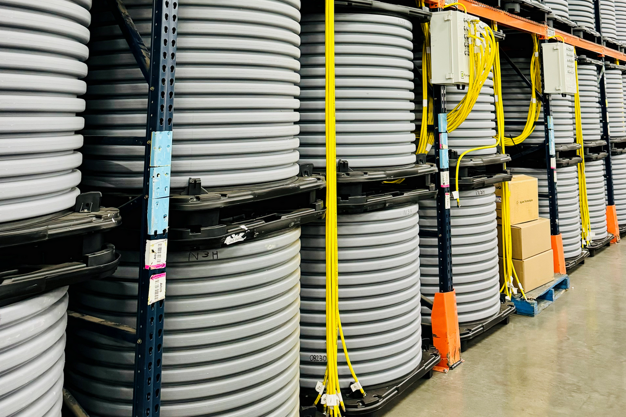Worldwide, and particularly in the US, the demand for flowers usually peaks for holidays such as Valentine's Day. How to meet this high demand while also delivering fresh, high-quality flowers? It is a true challenge for the industry. For this reason, many technologies have been developed to keep cut flowers fresh for a longer period. Among these is the innovation developed by RipeLocker, a US AgTech company based in Seattle, Washington. To prolong the life of postharvest perishables, they developed patented, low-pressure vacuum chambers called RipeLockers. Four years ago, they did the first trials with fresh-cut roses at US wholesalers, and two years ago the chambers were commercially loaded, now being used for the third time for Valentine's Day and Mother's Day flowers. This technology allows roses to be stored for up to 6 weeks, without experiencing gray mold decay and quality loss. They are continuously trialing with different commodities and recently they discovered that the chambers allow chrysanthemum cuttings to be stored for up to 4-6 weeks. Also, the chambers allow for the disinfestation of insects, without the use of any chemicals. "It's unique to have a technology that can do so much with just a little bit of air control", says Selynn Vong, Director of Marketing at RipeLocker.

How does it work?
The technology may sound easy, but it involved a lot of research, a process that continues to this day. Richard Kim, Director of Pathology at RipeLocker, explains what it is. "RipeLocker's patented low-pressure chamber design allows for commercial-scale implementation. It allows flower growers and suppliers to have a continuous supply of blooms throughout the year. It ensures the quality of delicate roses and other flowers, and it effectively manages supply fluctuations. Moreover, it suppresses gray mold decay and provides chemical-free disinfestation treatment for insects", he says. And how does it work? "In a RipeLocker, flowers are held in a vacuum under low pressure maintaining optimum levels of 02 and CO2. By using this hypobaric or low-pressure storage method the RipeLocker reduces oxygen levels to slow down respiration, and by lowering water vapor pressure it prevents flower dehydration. In addition, the RipeLocker eliminates possible ethylene buildup within the plant tissue or surrounding air. In this way, our solutions prolong the life of perishable commodities beyond what can be achieved by modern storage technologies. In addition, the circumstances in the chambers can be remotely adapted and monitored. And thanks to their small size, the chambers are very movable and shippable."
What does it mean for the flower industry?
Vong shares some concrete examples: "Take for instance the Colombian roses which are currently shipped in cardboard boxes. Thanks to our chambers, which can store approximately 2,500 rose stems each, these flowers can be stored for up to 6 weeks in Miami. By using RipeLockers, wholesalers, but also growers can store fresh-cut flowers for an extended period without quality loss. This allows them to store surplus when demand is low and to increase availability during peaks. In this way, the chambers smooth out supply fluctuations and significantly enhance the annual return on investment for the users of the chambers.
And recently, we discovered that the chambers are also useful for storing chrysanthemum cuttings. Usually, they only can be stored for up to 2 weeks, which means that harvesting and replanting them is a very labor-intensive process. By using the RipeLocker chambers, which we have conducted two trials with a Colombian grower, the cuttings can be stored for up to 4 weeks resulting in leveling out this labor-intensive process."
She continues by offering an example of the Ecuadorian flower industry, where the roses are shipped via air. With chambers installed at the port in the US, they can ship the flowers by ocean from Ecuador to the US port and store them for up to 6 weeks, till they are needed. Vong stresses the necessity of a cold room. "We can install the chambers everywhere, but they need to stay in a cold room with a certain temperature. In Ecuador, we are now doing demos at the production location."

Suppressing
Aside from extending the season and maintaining the flower quality, the chambers can also be used for suppressing decay. Kim explains: "The fungus Botrytis cinerea not only diminishes the yield in pre-harvest but also affects the postharvest quality of cut flowers. However, it's difficult to address due to the combination of the fungus' ability to cause latent infections and the delicate nature of flowers. Over the last three years, RipeLocker has demonstrated a substantial reduction of botrytis gray mold by controlling the levels of O2, CO2, and pressure. After 7 weeks of cold storage at 1°C, RipeLocker reduces the incidences of botrytis gray mold by 81% at the time of opening and 59% after 7 days of wet-packing simulation compared to the control."
Disinfestation of insects
Furthermore, RipeLocker states that its chambers can be used for quarantine insect infestation. "Managing thrips in cut flower production remains exceedingly difficult. Methyl bromide (MB) has historically served as a mainstay for thrips control in cut flowers. However, its usage is being phased out as a fumigant under the Montreal Protocol due to its ozone-depleting properties. The impending loss of MB could profoundly impact global agriculture, especially as there are currently no alternatives for achieving rapid disinfection of commodities. In this context, RipeLockers are an effective non-fumigant alternative. We conducted trials for which we stored flowers with thrips for 4 weeks. Under low pressure, the eggs of thrip larvae don't last long, and we managed to kill 96% of the thrips. Trials have shown that we can even kill 100% of the thrips when we inject low-dose Ozone molecules into the chambers. However, even when you don't inject any kind of molecules the RipeLockers are already highly effective," Kim elaborates.
More and more commodities are being trialed
Vong adds: "Currently, thrip control is mostly used for commercial peonies but we're trialing with other varieties, such as roses, hypericums, and more. We're also trialing with other usages of the system. We are a start-up with a small but highly experienced science team. We work hard to find out for which commodities our chambers are profitable while demand for our product Is increasing. We have a line at the door of people who ask us to try the RipeLockers on their commodities. We're doing trials on avocados, kiwis, papaya, peaches, pomegranates, tomatoes, and even tree nuts - the list is so long. So far, we've done trials in Morocco, Australia, New Zealand, South Africa, Latin America, Italy, and Belgium. Our chambers can serve a multitude of commodities across the board. I think it's unique to have technology that can do so much with just a little bit of air control. A main difference between our technology and other storage solutions is that it can also be used for insect and decay control. Moreover, the return on investment is 1,5- 2 years, frankly speaking, that's a very short time for a new, high-tech innovation."
For more information:
Selynn Vong
RipeLocker
[email protected]
www.ripelocker.com
